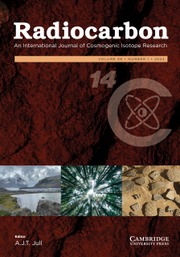Crossref Citations
This article has been cited by the following publications. This list is generated based on data provided by Crossref.
Posnansky, Merrick
and
McIntosh, Roderick
1976.
New Radiocarbon Dates for Northern and Western Africa.
The Journal of African History,
Vol. 17,
Issue. 2,
p.
161.
Fishman, Bernard
Forbes, Hamish
and
Lawn, Barbara
1977.
University of Pennsylvania Radiocarbon Dates XIX.
Radiocarbon,
Vol. 19,
Issue. 2,
p.
188.
Dee, M.W.
Rowland, J.M.
Higham, T.F.G.
Shortland, A.J.
Brock, F.
Harris, S.A.
and
Ramsey, C. Bronk
2012.
Synchronising radiocarbon dating and the Egyptian historical chronology by improved sample selection.
Antiquity,
Vol. 86,
Issue. 333,
p.
868.
Erdil, Pınar
Webster, Lyndelle
Kuitems, Margot
Knoblauch, Christian
Bestock, Laurel
Höflmayer, Felix
Beeckman, Hans
Fuller, Dorian Q.
Manning, Sturt W.
Dee, Michael W.
and
Lösch, Sandra
2025.
Resolution of the High versus Low debate for Old and Middle Kingdom Egypt.
PLOS One,
Vol. 20,
Issue. 5,
p.
e0314612.

